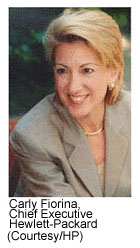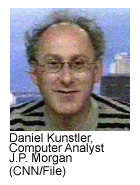|
HP confirms Price talks
|
 |
September 11, 2000: 4:03 p.m. ET
Technology firm mulls $18B purchase of accounting firm's consulting unit
By Staff Writers Richard Richtmyer and David Kleinbard
|
NEW YORK (CNNfn) - Hewlett-Packard Co. said Monday it is negotiating to buy PricewaterhouseCoopers' global management and technology consulting business for as much as $18 billion.
The move would catapult HP, the world's No. 3 computer maker, into a full-service computer manufacturing and services firm rivaled only by industry titan IBM.
HP said the acquisition would add to its current 15 percent revenue-growth forecast for fiscal 2001 but weigh slightly on its earnings per share. The company said the transaction would be neutral to earnings in fiscal 2002.
Investors weren't quite ready to embrace the idea Monday. HP (HWP: Research, Estimates) shares fell $7 to $114, a near 6 percent decline.
Daniel Kunstler, computer analyst at J.P. Morgan in San Francisco, characterized that decline as "a reasonably mild negative reaction."
"I think the reaction to the stock is highly rational," Kunstler said in an interview on CNNfn Monday.
 Although he said the deal would represent a sound strategic move for HP, he warned that there could be some disruption to HP's existing services business. HP has roughly 6,000 people in its services business, while they would be acquiring a business with more than 30,000 employees, he said. Although he said the deal would represent a sound strategic move for HP, he warned that there could be some disruption to HP's existing services business. HP has roughly 6,000 people in its services business, while they would be acquiring a business with more than 30,000 employees, he said.
"I think we have to take a little bit of a wait-and-see attitude toward the deal and see what kind of terms are going to be agreed upon, if indeed the deal does get concluded," he said. "Also, we need to see what kind of strategic statements Hewlett-Packard makes because this is going to be pretty much a life-changing experience for the company."
Hewlett-Packard said terms of the transaction have not been agreed on, and "significant issues" still need to be resolved. The company would only say that the two parties are contemplating a cash-and-stock acquisition.
A natural course of action
Industry observers were not surprised by Monday's announcement, considering the trends in both the information technology and the consulting industries.
In an environment where information technology professionals are in short supply, most computer hardware companies have been trying to strengthen their services practices.
"The constant 'mine is faster than yours' isn't what companies want anymore," said Sam Albert, president of Sam Albert Associates, an information technology consulting firm in Scarsdale, N.Y. "They want a solution to their business problem, and they realize that the glue that puts together the solution is services."
At the same time, the big accounting firms have come under increasing regulatory scrutiny because in many instances they offer consulting services to the same clients whose books they are auditing, Albert said.
Technology companies already have begun to take advantage of that situation. Cisco Systems (CSCO: Research, Estimates) last year bought a 19.9 percent stake in KPMG's consulting business, which plans an initial public offering. Ernst & Young is selling its consulting operations to French technology services group Cap Gemini for $11 billion.
Albert said he expects to see more technology companies teaming with consulting firms in the future.
 "Every one of the companies in the IT sector, whether it's a hardware firm or a software firm, is going to align themselves with or acquire services," he said. "Every one of the companies in the IT sector, whether it's a hardware firm or a software firm, is going to align themselves with or acquire services," he said.
Under the stewardship of Carly Fiorina, who took the reigns as chief executive last summer, HP has been moving more aggressively into the information technology services area, although it still remains the company's smallest line of business.
During its fiscal third-quarter ended July 31, HP said revenue from its IT services business rose 17 percent to $1.8 billion and that unit's profit was $178 million, a 42 percent increase from $125 million in the year-earlier quarter.
SG Cowen analyst Richard Chu said HP had $7.2 billion in services revenue in 1999, $1.5 billion of which came from consulting. The PricewaterhouseCoopers deal would effectively double that, Chu said.
PricewaterhouseCoopers reported that its consulting business' revenue in 1999 was $4.96 billion, up 27 percent from the previous year's total.
A new conflict of interest?
For PricewaterhouseCoopers, the world's top professional services firm, the deal finally would remove the company from the U.S. Securities and Exchange Commission's radar screen. SEC Chairman Arthur Levitt repeatedly has expressed concern about the conflict of interest presented by PricewaterhouseCoopers' structure, which includes leading accounting and consulting businesses.
 The New York-based company retained investment bank Morgan Stanley and made plans to split the two operations earlier this year, but an outright sale would accelerate that process. The New York-based company retained investment bank Morgan Stanley and made plans to split the two operations earlier this year, but an outright sale would accelerate that process.
However, by merging with HP the company's technology consulting unit could find itself facing a new kind of conflict, according to J.P. Morgan's Kunstler. He pointed out that technology companies often use their consulting and services divisions to boost sales of the rest of their products, which could get in the way of a consultant's fiduciary responsibility to act in the best interests of the customer. [176K WAV or 176K AIFF]
PricewaterhouseCoopers currently serves as HP's independent accountant. HP said that relationship is expected to be terminated as a result of the negotiations.
The company's management consulting arm has 31,000 consultants and 1,400 partners, according to a company spokesman. He would not say what percentage of the partners would need to approve the deal.
If the consulting unit were purchased, the proceeds would go to all 10,000 PwC partners. Thus, each partner could receive as much as $1.8 million if the unit were sold for $18 billion, although some of the proceeds a sale likely would be retained within PwC as investment capital.
A deal also could disrupt some of the relationships PricewaterhouseCoopers has with its existing hardware and software partners.
The company's consulting arm, which is led is led by Scott Hartz, is divided into three service areas: Strategic Change, Process Improvement, and Technology Solutions. The tech solutions part helps clients select and install a large variety of hardware and software, and the unit commonly works with JD Edwards (JDEC: Research, Estimates), Oracle (ORCL: Research, Estimates), Siebel (SEBL: Research, Estimates), German software firm SAP (SAP: Research, Estimates), and PeopleSoft (PSFT: Research, Estimates). 
-- Reuters contributed to this report
|
|
|
|
|
 |

|

